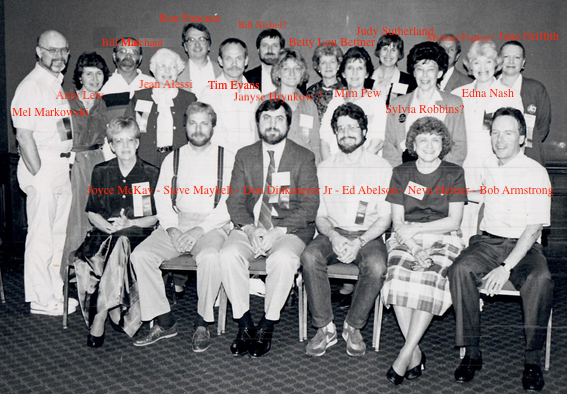
Welcome to The Connection,
NASAP’s Online Newsletter
September 2025 Issue
Dear Adlerians,
Since March of this year, I have been most fortunate to have the support of three editorial interns – all international students attending Adler University in Vancouver. These three wonderful budding Adlerians have made six months of The Connection possible by liaising with our president and executive director, drafting original articles, sorting through photographs and content, and laying out The Connection beautifully in its web format.
I am sorry to say that Cynthia Chiamaka Ogueri of Nigeria, Harshdeep Kaur of India, and Fizza Mushtaq of Pakistan have all completed their stints as interns for our publication. This September issue is therefore a tribute to these three talented professionals. Please enjoy original articles on classic and modern Adlerian topics written by Cynthia and Fizza in this issue. And look forward to a special article on Social Interest in Everyday Life crafted by Harshdeep in the future. Please join me in wishing these three outstanding women well as they continue in their professional journeys in Adlerian Psychology.
As always, as you read this issue, please consider how you might contribute to The Connection in the future. Feel free to submit your articles, announcements, and photos to the email address below.
Sincerely,
Ellen Alderton, Editor
NASAPNews@gmail.com
P.S. If you wish to receive future issues of The Connection, be sure to sign up for a NASAP membership. Use the button in the top right corner to access the member login/sign-up page. There are several membership levels to choose from, and you will then be eligible for other member perks like discounts on conference registrations.
Dear Fellow Adlerians,
Warm regards,
Hallie M. Williams, Sr.
President, North American Society of Adlerian Psychology
President’s Message
Updates from HQ, September 2025
By Susan Belangee, Ph.D., NASAP Executive Director
While the month or two following the annual conference tends to be a little slower, August usually brings a new flurry of activity. As I write this in August, this year is no exception. Proposals are already being submitted for next year’s annual conference (you can find the links to submit a proposal on this page of the website). Be sure to download and share the save the date flyer that is linked on that same page! Plans are also forming for a Winter virtual event, so stay tuned to future newsletters for information about that.
For those who may not have heard the great news, NASAP was granted five-year approval by APA to offer CEs for psychologists. This means that live events for the next five years will support psychologists needing CEs for licensure renewal requirements.
Equally exciting is the new LMS (learning management system) for NASAP, called Thinkific. The hard work of Rocky Garrison, and Ben Rader (current President elect) who recently started helping with the project, has made earning CEs for counselors incredibly easy. There are individual articles as well as “courses” on specific topics that provide more in-depth study. To access the Thinkific site, use this link.
Did you know that NASAP offers two certifications? The original one is the Certificate of Study in Adlerian Psychology, which requires 100 hours of training that can include conference sessions, graduate level coursework, attending TAP Talks, and even completing “course” and reading articles in Thinkific. The second certification is the Certificate in Adlerian Psychotherapy, which requires 100 hours of training in addition to 10 hours of supervision experiences (plus other requirements). Every year at our conference, those who earn certificates are honored – make sure this is you, next year in Minnesota! For all the details on both certifications, visit this page on the website.
If you ever encounter any issues with your membership, please email the office at executivedirector@alfredadler.org.
Truly,
Susan
Save the Date: SCSAP’s Annual Adlerian Conference in South Carolina
Join us in Greenville, South Carolina, October 10–12, 2025 for three days of Adlerian energy, community, and conversation. Expect a mix of workshops, keynotes, and connections designed to leave you sharper, braver, and more inspired in your practice and in your life.
This year we’re honored to welcome You are Invited to Enjoy the CCLP Group — one of the most widely published and influential voices in the helping professions — as our keynote speaker and a featured workshop presenter. Kottler’s work has shaped how countless counselors, therapists, and educators think about change, resilience, and meaning. Having him with us is both rare and remarkable, and we couldn’t be more excited.
Early-bird registration is open now. Scholarships are also available (details on our website).
Come for the learning, stay for the people. This is Adlerian psychology at its most alive.
Learn more and register: www.adleriansc.org
A Day in the Life of a NASAP Intern: Writing with Purpose
By Fizza Mushtaq, Editorial Intern
When I first accepted the position as a remote editorial intern with NASAP, I felt a mix of excitement and uncertainty. Working from the comfort of my apartment, with only biweekly Zoom meetings and a modest number of hours dedicated to the newsletter, I expected the experience to be quiet and largely independent. I wondered how much genuine connection I would find, given the distance and the digital nature of our interactions. However, as the weeks passed, I discovered something unexpected: a deep sense of purpose rooted in the very Adlerian principles that NASAP champions—social interest, encouragement, and belonging.
At first, the remote setup seemed isolating. But as I began to delve into my responsibilities, I realized that the digital environment offered unique opportunities for connection. The newsletter is more than just a communication tool; it is a bridge between NASAP and its vibrant community. I found myself inspired by the collective spirit and the shared commitment to Adlerian values, which emphasize the importance of community, mutual respect, and the belief in every individual’s potential.
Writing with Intention
Most of my internship tasks are flexible and asynchronous, allowing me to create a work rhythm that fits my schedule. I typically begin my day by reviewing article submissions, revisiting past newsletters, and reading up on the latest developments in Adlerian Psychology. This routine not only keeps me informed, but also helps me maintain a consistent and thoughtful approach to my writing.
Recognizing that the newsletter serves as a vital conduit between NASAP and its professional community, I strive to ensure that every piece I write or edit is clear, engaging, and reflective of our core values. Clarity and tone are crucial; readers should feel welcomed and valued, whether they are seasoned professionals or new to Adlerian Psychology. I am particularly mindful of the importance of affirming human dignity and agency in my writing, principles that are central to Adlerian thought. This means choosing words that uplift, encourage, and inspire while also respecting the diversity of experiences and perspectives within our community.
One of the most rewarding aspects of my role is the opportunity to collaborate with contributors from various backgrounds. Each submission brings a unique voice and perspective, enriching the newsletter and, by extension, the NASAP community. I take great care to preserve the authenticity of these voices while ensuring that the content is accessible and meaningful to all readers. Writing with intention, for me, is about more than just conveying information; it’s about fostering connection and understanding.
Encouragement in Practice
Although I am not providing therapy or leading workshops, I have come to appreciate how my work supports the broader mission of NASAP. Even seemingly small tasks, like editing a paragraph about an upcoming event, can have a meaningful impact. When I consider how my words might inspire someone to join the community or attend a session, I am reminded of the power of encouragement in everyday interactions.
Recent research highlights the importance of encouragement in promoting courage and belonging, particularly in academic and community settings. Encouragement, when practiced consistently, helps individuals feel valued and supported, fostering a sense of connection and resilience. I am learning that written communication, too, can be a powerful form of support. Whether through a thoughtful edit or a well-crafted introduction, I have the opportunity to uplift others and reinforce the values of social interest and belonging.
As a remote intern, I am part of this tapestry, bringing my perspective and learning from the experiences of others. This sense of shared growth is at the heart of Adlerian psychology and is something I strive to reflect in my work.
Before beginning her studies at Adler University, Fizza Mushtaq worked as a physiotherapist at the Fauji Foundation Hospital in Lahore, Pakistan.
Receive a Free CE Credit for Reading a Classic Article This September
Reference: Birnbaum, F. (1936). Some principles to be observed in a healthy conduct of life. International Journal of Individual Psychology, 2(3), 46-54.
Go to https://nasap.thinkific.com/, create an account if you don’t have one, search for “Birnbaum,” and click on the “Principles of Healthy Conduct” course page to begin. You can download the article, then answer the quiz and receive 1.1 CE hours.
Author Information: Ferdinand Birnbaum (1892 – 1947) was trained as a secondary school teacher. He met Adler in 1920 and became active in Viennese Individual Psychology. From 1924 to 1934 he participated in the Individual Psychology Experimental School with Oskar Spiel and Franz Scharmer. During World War II, he belonged to an illegal Individual Psychology working group, and after the war he tried to revive the Association for Individual Psychology in Vienna.
Birnbaum (1936) discusses five principles of healthy living – sovereignty, initiative, solidarity, productiveness, and meliorism – operationalizing the Individual Psychology construct of Gemeinschaftsgefühl. These principles emphasize the “… obligation to assume full responsibility for oneself” (p. 46), taking into account “… the common natural ties existing among all human beings” (p. 48), and being active, useful, and optimistic. He emphasizes that the formula for proper living has not been found as well as the aspirational nature of these principles in the “… three relationships in which every human being is unavoidably involved: society, work, and sex” (p. 46).
He also describes a three-step process for addressing the errors in one’s style of living. The first step is to identify the mistakes, which he calls “… infantile behavior which are continued even after they are divorced from the early childhood situation of their origin” (p. 46). The second step is “… to examine my childhood with regard to finding out the incentive and the opportunity it gave me for developing the character traits” (p. 47). The third step is a “… movement toward a conscious assumption of responsibility for by behavior” (p. 47) emerging out of “… repeated experiences of discovery” (p. 47). “Individual Psychology knows only one ‘sin’ – the retention of a mistaken infantile attitude, which always manifests itself in a choking of the community feeling by an exaggerated desire for power” (pp. 47-48).
Adlerian Psychology in Schools: How Educators Can Apply Its Principles
By Cynthia Chiamaka Ogueri, Editorial Intern
Alfred Adler's Individual Psychology, developed over a century ago, remains profoundly relevant in modern educational settings, offering a holistic, socially embedded, and strength-based framework for understanding students and fostering positive development. At its heart, Adlerian school practice rejects deterministic views, emphasizing instead that behavior is purposeful and shaped by the individual’s unique interpretation of the world and his or her efforts to find a place within it. Grounded in core principles such as social interest, striving for significance and belonging, goal-directed behaviour, and subjectivity of perception and the creative self, Adlerian approaches provide practical tools that move beyond mere behavior management to cultivate intrinsic motivation and responsibility. These tools, in turn, promote resilience and offer educators a profoundly relevant, humanistic, and effective framework for understanding student behavior. By applying Adlerian principles, educators can foster healthy classroom communities and promote equitable outcomes.
A key Adlerian concept for educators is recognizing that all behavior is purposeful. Students act to achieve belonging and significance within their social groups – such as family, classroom, and peers. When students feel discouraged or lack constructive skills to achieve these goals, they may adopt “mistaken goals.” They may seek undue attention, engage in power struggles, or display inadequacy. Instead of labeling students as “defiant” or “lazy,” Adlerian educators ask questions such as, “What is the underlying goal of this behavior?” or “How is the student feeling discouraged?” Identifying the goal allows for targeted, effective interventions focused on addressing the unmet need for connection or capability, rather than merely suppressing the symptom. Adlerians, in other words, seek to understand behavior through purpose, not pathology.
Adlerian Psychology further distinguishes encouragement from praise. Praise focuses on outcomes and inherent traits, fostering dependence on external validation. Encouragement, such as when a teacher says, “I can see you put a lot of effort in your work and you’re engaging,” focuses on progress, specific contributions, and intrinsic worth. Encouragement is the primary antidote to discouragement and is crucial for helping students develop social interest. Educators can foster social interest by consistently noticing and verbalizing effort, improvement, and cooperative acts. This encouragement builds self-efficacy, the belief that “I am capable,” by acknowledging the student’s progress.
Perhaps the most direct application of Adlerian psychology in school settings is through the implementation of regular classroom meetings. These structured forums, grounded in Adlerian democratic principles, are powerful tools for building community, teaching social-emotional skills, gaining insights from peers, and solving problems collaboratively. In classroom meetings, students:
● Set rules collaboratively.
● Solve problems.
● Plan activities and curriculum.
● Give and receive compliments and show appreciation.
Adlerian Psychology, moreover, demands attention to context. Understanding a student's “private logic,” their subjective interpretation of the world, necessitates understanding how their cultural background, race, socioeconomic status, gender identity, neurodiversity, or experiences of discrimination shape their perceptions, goals, and sense of belonging. True social interest requires creating an inclusive community where all students feel they belong and can contribute meaningfully.
Multiple evidence supports Adlerian approaches. Studies show reductions in disruptive behaviors, improved classroom climate, enhanced student responsibility and motivation, better social skills, and increased teacher efficacy. Substantial empirical evidence also validates core Adlerian tenets such as encouragement, democratic classrooms, collaborative problem-solving, Social Emotional Learning, and family engagement.
Adlerian Psychology provides educators with a timeless yet urgently relevant framework for creating schools where students feel a deep sense of belonging, significance, and capability. By understanding the purpose of behavior, relentlessly focusing on encouragement, building democratic communities through practices like classroom meetings, and integrating with Social Emotional Learning, teachers can improve well-being for their students and in their classrooms.
Cynthia Chiamaka Ogueri served as a health promotion officer and adjunct editor in Nigeria before launching her studies at Adler University.
You are Invited to Join the CCLP Group
Community Conversations for Living on Purpose (CCLP) is a group comprised of community members who are dedicated to the application and promotion of Adlerian principles in daily life. We want to create a space for individuals to have conversations that help people contribute to building an inclusive community that fosters encouragement, nourishes acceptance, and promotes connections where people feel a sense of belonging.
We meet monthly on the last Saturday of every month from 10:00AM to 11:30AM via Zoom. We are inviting you to be part of our conversations. You can register here (https://us06web.zoom.us/meeting/register/3E5R3He4RRiZISXQkiMNmA) for our meetings. The next meeting takes place on Saturday, September 27, 2025, and the topic for discussion is Developing Courage and Building Encouragement.
We would love to hear your thoughts and experiences … join our email list (cclpconnections@gmail.com). To learn more about us, visit our website at http://www.communityandconnections.ca/. We look forward to connecting and conversing with you.
Regards,
Charmaine McIntosh, Psy.D.
Updates from the Resilience Counseling and Training Center
Drs. Bill and Monica Nicoll of the Resilience Counseling and Training Center (RCTC) report that the first half of 2025 has kept them quite busy! RCTC continues to seek creative strategies and new venues for advancing the knowledge and applications of Adler’s Individual Psychology. To date, RCTC’s 2025 efforts have involved the following:
Monica published her book, Know Thyself, which explores the use of early memories for understanding oneself as well as the rewriting of one’s memories to facilitate healing and growth.
Bill was a keynote speaker in Greece at a mini conference sponsored jointly by the Greek Society for Adlerian Psychology and the European Association of Applied Psychology. The conference was hosted by the College for Humanistic Sciences in Athens.
Bill is currently providing weekly staff training sessions via Zoom for professional counselors and educators in Nigeria on Adlerian approaches to fostering resilience and well-being in children via parenting, teaching, and counseling.
Close Up Radio spotlighted Monica this spring in an interview regarding Resilience, Early Memory Reorientation, and Supporting Children in High-Conflict Divorces. To listen to the interview by award-winning broadcast/radio hosts, Doug Llewelyn and Jim Masters, click here.
Bill was recently named an honorary member of the European Association of Applied Psychology “in recognition of his exceptional contributions to the advancement of psychology and counseling across Europe.”
RCTC is currently completing an educator’s guidebook for developing Social Emotional Learning (SEL) programs in schools based in Adlerian Psychology. It is designed to actively promote “social interest/ resilience/ emotional well-being” in students. The program emphasizes three key components: (1) classroom SEL lessons, (2) a parent collaborative component, and (3) strategies for building a “social interest/resilience-based” school ecosystem (culture). More information to be available in fall 2025.
Learn more at www.resiliencecounselingcenter.com
〰️
Learn more at www.resiliencecounselingcenter.com 〰️
Updates on the photo challenge.
Updates on the photo challenge.
Our May photo challenge continues to attract comments.
Bryna Gamson and Amy Lew provided the updated photograph below with orange labels. They also provided the following comments: They confirmed with Erik Mansager that he was not in the photo. They were unsure about Bill Nicoll, but Bill has confirmed he is in the photo (see below). They are unsure about Michael Popkin, but are “pretty sure” the man labeled in the photo is not Michael. Sylvia Robbins is also a guess. They are “pretty sure” about Jean Alessi and about Janyse Hrynkow.
Bill Nicoll of North Conway, New Hampshire informs us that the following people are pictured in the back row: 3rd from left, Bill Marchant; 4th from left, Ron Pancner; 5th from left, Bill Nicoll.
John Newbauer concurs that Ron Pancner is 4th from the left in the back row.
Facilitated Group Singalongs in a Retirement Home in Canada
Dr. Christopher Eriksson informed The Connection about this article which was posted by the World Health Organization.
Adler recommended that therapists and facilitators should be striving to acquire some definite artistic ability, which requires mature self-understanding, a ready wit, the ability to convince, being convinced oneself, and a willingness to cooperate. These same traits are acknowledged to play a key role in successful Person-Centered Care, increasingly seen as the ideal standard of care in retirement homes and long-term care facilities.
Guided by Adler’s recommendations and a person-centered care approach, a facilitated musical singalong program for people living with dementia in a Canadian retirement home has consistently resulted in outcomes typically associated with successful musical therapy where musical memory is seen to be present leading to changes in behaviour. The guided singalong sessions involve playing well-known, popular music songs available on YouTube with visible words on the TV screen to encourage and facilitate residents to participate and join in with singing themselves. When facilitating the sessions, the facilitator dances, sings, and moves to the rhythm of the music inviting the residents to join however they can. The sessions appear to create an entertaining “togetherness,” an atmosphere of wonder and expectation, of letting go to be one with the rhythm.
When listening to the music, most participants appear to positively respond to the music by singing and tapping their feet, swinging from side to side, and/or tapping their feet or moving their hands. Some participants may not show any movement or singing, but on occasion, they may suddenly get up to join the facilitator in dancing to the music. Some may get upset while listening to the music. Other staff are also encouraged to join in with a resident in dancing to the rhythm of the music.
From observations from this program, facilitating a music program using a person-center care approach may be one suitable option to support the wellbeing of people living with dementia residing in a long-term care facility.
If you would like more information about this work, please visit this link.
Letter to the Editor
Dear Editor:
Adler’s theory defines the need to belong as the basic human need, an innate need for survival. He wrote about the need for affection that never goes away in 1908 by defining this need as an essential part of the social feeling. Over the last one hundred and seventeen years many psychiatrists, psychologists, and authors have written about this requirement for connections with others as if it was their work based on social research with no search for the origin of this idea. We now have several books on the importance of social connections without full research or mention of Adler. The latest of these “discoveries” is a book entitled The Connection Cure that describes many doctors who are writing out prescriptions, not for medicine but for finding ways to connect with others. The author further claims that it is being prescribed for type 2 diabetes, chronic pain, dementia, ADHD, anxiety, and depression.
It continues to be the plight of Alfred Adler, who continues to have his words printed under others’ names without proper citation. This is called plagiarism. William James stated in a lecture he gave, “First, you know, a new theory is attacked as absurd; then it is admitted to be true, but obvious and insignificant; finally it is seen to be so important that its adversaries claim that they themselves discovered it.” As faithful Adlerians, I wish we could all find ways to give Adler credit for his original work that we have been able to use in helping so many others.
— Betty Lou Bettner, Ph.D., co-author of The Crucial Cs
Editor’s Comment
Betty Lou Bettner brings up an important point that troubles many Adlerians — the all too common and wholesale appropriation of Adler’s ideas without credit. In his tome on the history of psychiatry, The Discovery of the Unconscious, Henri Ellenberger writes most eloquently about this concern:
“It would not be easy to find another author from which so much has been borrowed from all sides without acknowledgement than Alfred Adler. His teaching has become, to use a French idiom, an “open quarry” (une carriére publique), that is, a place where anyone and all may come and draw anything without compunction.”
NASAP member and former editor of The Connection, Jess Minckley, designs websites for therapists.
Email: mincwork@gmail.com
Phone & Text: (323) 305-9689
Website: http://www.minc.work
Zoom Meeting Link: https://zoom.us/j/98561077662

Our Editorial Team
Ellen Lee Alderton, Editor
Cynthia Chiamaka Ogueri, Editorial Intern
Harshdeep Kaur, Editorial Intern
Fizza Mushtaq, Editorial Intern










